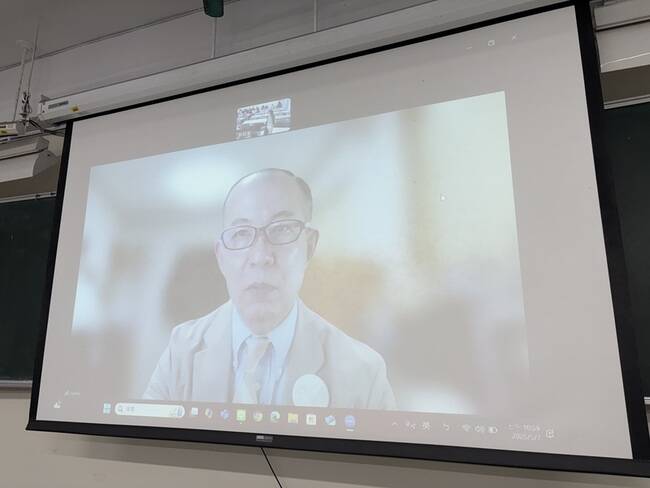A former Japanese defense officer said Wednesday Taiwan is at the center of a new “one-theater” defense concept, which Japan reportedly proposed to the United States earlier this year in response to growing security challenges posed by China.
Kiyoshi Ogawa delivered a speech on Japan’s defense strategy in English yesterday during a teleconference organized by New Taipei-based Tamkang University. The former Japanese general, who retired in 2017, was a commander of Japan’s Ground Self-Defense Force’s Western Army.
In his speech, Ogawa said Japanese Defense Minister Gen Nakatani reportedly proposed the “one-theater” approach to his American counterpart Pete Hegseth during their meeting in Tokyo on March 30, with the aim of containing China.

Photo: CNA
According to a report by Japan’s Asahi Shimbun on April 14, the new concept links the East China Sea, the South China Sea, the Korean Peninsula and surrounding areas as one theater where military operations are conducted during wartime. Historically, these areas have been treated separately.
Hegseth reportedly welcomed Nakatani’s proposal, unnamed government sources told the Asahi Shimbun.
While the Asahi Shimbun reported senior Japanese defense officials developed the “one-theater” idea, its geographic scope has not been defined. Neither Tokyo nor Washington have publicly confirmed discussions of the “one-theater” concept.
In his speech, Ogawa said Taiwan is definitely at the center of the “one theater” concept.
“To deter a Chinese invasion is very difficult, but I think we can [with joint efforts by regional partners,]” he said.
During last year’s Joint Sword-2024A and B exercises, China tested its Taiwan invasion scenarios, Ogawa said.
The People’s Liberation Army (PLA) is likely to attempt to land in central Taiwan by means of “amphibious assault ships or transport helicopters” before heading north and south; namely, northbound to the political and economic capital Taipei and southbound to the port city of Kaohsiung which houses a key navy base, he said.
“China wants to invade Taiwan and achieve total control before foreign forces intervene.”
Asked what Taiwan could do to beef up its defense in case of a Chinese invasion, Ogawa said Taiwan’s Army needs armored vehicles in order to build up a stronger defense to buy Taipei more time before U.S. and Japanese forces can come to its aid.
Ogawa is currently a senior research fellow at Japanese think tank, Security Strategy Research Institute of Japan.

Japanese footwear brand Onitsuka Tiger today issued a public apology and said it has suspended an employee amid allegations that the staff member discriminated against a Vietnamese customer at its Taipei 101 store. Posting on the social media platform Threads yesterday, a user said that an employee at the store said that “those shoes are very expensive” when her friend, who is a migrant worker from Vietnam, asked for assistance. The employee then ignored her until she asked again, to which she replied: "We don't have a size 37." The post had amassed nearly 26,000 likes and 916 comments as of this

US President Donald Trump said "it’s up to" Chinese President Xi Jinping (習近平) what China does on Taiwan, but that he would be "very unhappy" with a change in the "status quo," the New York Times said in an interview published yesterday. Xi "considers it to be a part of China, and that’s up to him what he’s going to be doing," Trump told the newspaper on Wednesday. "But I’ve expressed to him that I would be very unhappy if he did that, and I don’t think he’ll do that," he added. "I hope he doesn’t do that." Trump made the comments in

Tourism in Kenting fell to a historic low for the second consecutive year last year, impacting hotels and other local businesses that rely on a steady stream of domestic tourists, the latest data showed. A total of 2.139 million tourists visited Kenting last year, down slightly from 2.14 million in 2024, the data showed. The number of tourists who visited the national park on the Hengchun Peninsula peaked in 2015 at 8.37 million people. That number has been below 2.2 million for two years, although there was a spike in October last year due to multiple long weekends. The occupancy rate for hotels

A cold surge advisory was today issued for 18 cities and counties across Taiwan, with temperatures of below 10°C forecast during the day and into tonight, the Central Weather Administration (CWA) said. New Taipei City, Taipei, Taoyuan and Hsinchu, Miaoli and Yilan counties are expected to experience sustained temperatures of 10°C or lower, the CWA said. Temperatures are likely to temporarily drop below 10°C in most other areas, except Taitung, Pingtung, Penghu and Lienchiang (Matsu) counties, CWA data showed. The cold weather is being caused by a strong continental cold air mass, combined with radiative cooling, a process in which heat escapes from